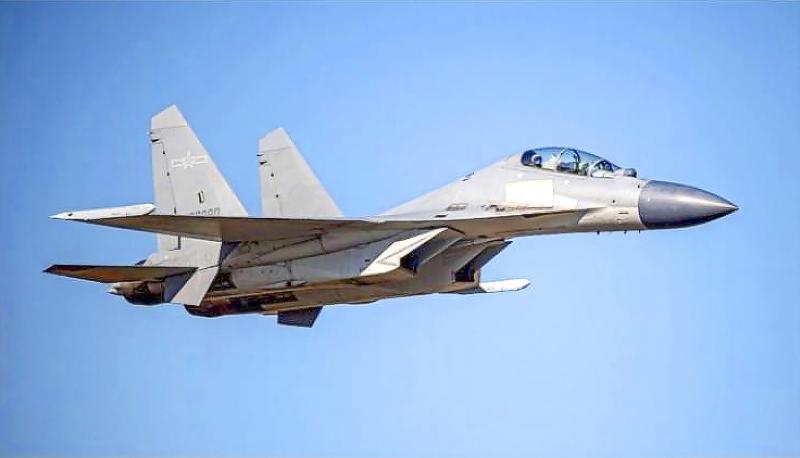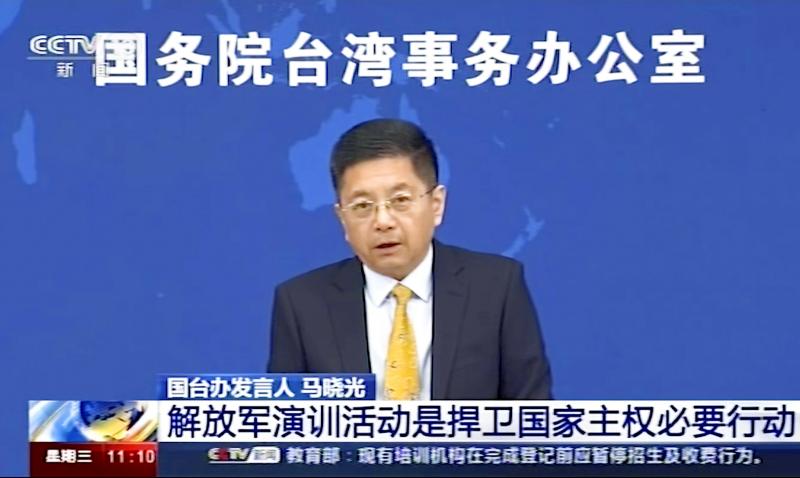China’s recent increase in military exercises and warplane missions near Taiwan was necessary to defend sovereignty and territory, a Chinese official said yesterday, prompting Taipei to say that it had sabotaged peace and stability across the Taiwan Strait.
China’s military flew 56 planes off the southwest coast of Taiwan on a single day earlier this month, a single-day record that capped four days of a sustained pressure campaign involving 149 flights in international airspace.
The purpose of the maneuvers was to “fundamentally safeguard the overall interests of the Chinese nation and the vital interests of people on both sides of the Taiwan Strait,” China’s Taiwan Affairs Office spokesman Ma Xiaoguang (馬曉光) said, without specifying a threat.

Photo: AP
“The People’s Liberation Army exercises are necessary actions to defend [Chinese] national sovereignty and territorial integrity,” Ma told reporters at a biweekly news conference in Beijing.
In Taipei, Ministry of Foreign Affairs spokeswoman Joanne Ou (歐江安) said that China has sabotaged peace and stability across the Taiwan Strait with its military provocation, diplomatic coercion and economic pressure against Taiwan.
Chinese aggression has also sparked concerns from the US and other partners of Taiwan, highlighting the importance of the nation’s security and its strategic role in the international community, Ou said in a statement.

Photo: AP
Taiwan will continue to defend the peace and stability in the Taiwan Strait and the Indo-Pacific region, bolster its self-defense capabilities, and protect its freedom and democratic institutions, she said.
Over the past few days, several high-ranking US officials have urged Beijing to stop coercing Taiwan with military force, while reaffirming Washington’s commitment to Taiwan as “rock solid,” Ou said, thanking Washington for its support.
In a talk this week with journalists, political scientist Shelley Rigger said that while the cross-strait situation seemed more intense, it was more likely being used as a deterrent.
China is “trying to deter Taiwan from imagining that there is some kind of opportunity to make a change in its own position and also trying to deter the US from providing support or creating the impression in Taiwan that this might be a moment for Taiwan to push the envelope harder,” said Rigger, a longtime observer of Taiwanese politics at Davidson College in North Carolina.
“I also think that there is an element of the PLA [People’s Liberation Army] kind of testing its own operational capabilities, and so it’s kind of killing two birds with one stone,” Rigger said. “You’re sending a strong message to Taiwan and to the US, and you’re also getting a lot of flight hours at a minimum for your military personnel.”
Additional reporting by Lin Chia-nan

UKRAINE, NVIDIA: The US leader said the subject of Russia’s war had come up ‘very strongly,’ while Jenson Huang was hoping that the conversation was good Chinese President Xi Jinping (習近平) and US President Donald Trump had differing takes following their meeting in Busan, South Korea, yesterday. Xi said that the two sides should complete follow-up work as soon as possible to deliver tangible results that would provide “peace of mind” to China, the US and the rest of the world, while Trump hailed the “great success” of the talks. The two discussed trade, including a deal to reduce tariffs slapped on China for its role in the fentanyl trade, as well as cooperation in ending the war in Ukraine, among other issues, but they did not mention

Japanese Prime Minister Sanae Takaichi yesterday lavished US President Donald Trump with praise and vows of a “golden age” of ties on his visit to Tokyo, before inking a deal with Washington aimed at securing critical minerals. Takaichi — Japan’s first female prime minister — pulled out all the stops for Trump in her opening test on the international stage and even announced that she would nominate him for a Nobel Peace Prize, the White House said. Trump has become increasingly focused on the Nobel since his return to power in January and claims to have ended several conflicts around the world,

GLOBAL PROJECT: Underseas cables ‘are the nervous system of democratic connectivity,’ which is under stress, Member of the European Parliament Rihards Kols said The government yesterday launched an initiative to promote global cooperation on improved security of undersea cables, following reported disruptions of such cables near Taiwan and around the world. The Management Initiative on International Undersea Cables aims to “bring together stakeholders, align standards, promote best practices and turn shared concerns into beneficial cooperation,” Minister of Foreign Affairs Lin Chia-lung (林佳龍) said at a seminar in Taipei. The project would be known as “RISK,” an acronym for risk mitigation, information sharing, systemic reform and knowledge building, he said at the seminar, titled “Taiwan-Europe Subsea Cable Security Cooperation Forum.” Taiwan sits at a vital junction on

LONG-HELD POSITION: Washington has repeatedly and clearly reiterated its support for Taiwan and its long-term policy, the Ministry of Foreign Affairs said US Secretary of State Marco Rubio yesterday said that Taiwan should not be concerned about being used as a bargaining chip in the ongoing US-China trade talks. “I don’t think you’re going to see some trade deal where, if what people are worried about is, we’re going to get some trade deal or we’re going to get favorable treatment on trade in exchange for walking away from Taiwan,” Rubio told reporters aboard his airplane traveling between Israel and Qatar en route to Asia. “No one is contemplating that,” Reuters quoted Rubio as saying. A US Treasury spokesman yesterday told reporters